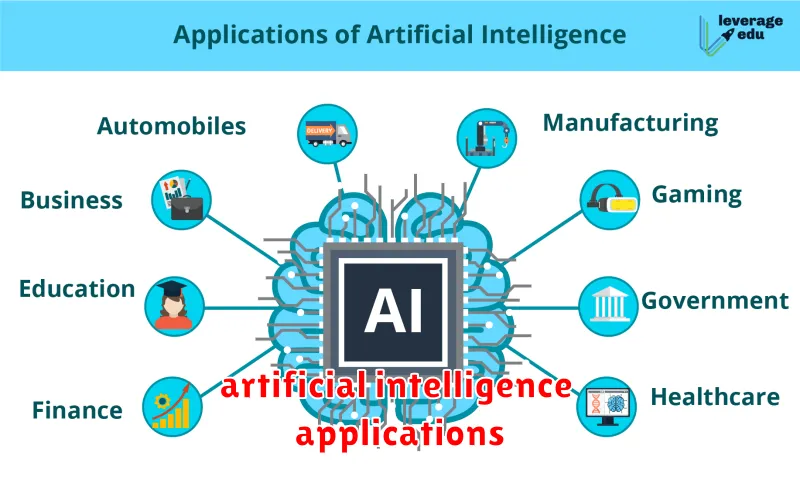The world of technology is rapidly evolving, and at the forefront of this evolution is Artificial Intelligence (AI). No longer confined to the realm of science fiction, AI is now an integral part of our daily lives, transforming industries and impacting every aspect of our society. From personalized recommendations on streaming platforms to self-driving cars, the applications of AI are becoming increasingly sophisticated and impactful. This article delves into the extraordinary potential of AI and explores its innovative applications that are revolutionizing various industries.
The ability of AI to learn, analyze, and make predictions based on vast amounts of data has unlocked unprecedented possibilities. Businesses are leveraging AI to optimize operations, enhance customer experiences, and gain a competitive edge. From healthcare to finance, manufacturing to retail, AI is driving innovation and pushing the boundaries of what was once thought impossible. Join us as we explore the exciting world of AI and uncover how it is shaping the future of our world.
The Rise of Artificial Intelligence: A New Era of Innovation
Artificial intelligence (AI) is rapidly transforming the world around us. From self-driving cars to personalized medicine, AI is already having a significant impact on our lives. And as AI continues to evolve, it promises to revolutionize countless industries and aspects of human existence. The rise of AI is a testament to the relentless pursuit of innovation and the boundless possibilities that technology offers.
At the heart of this transformative wave lies a confluence of factors. The exponential growth of computing power, the availability of vast datasets, and groundbreaking advancements in algorithms have propelled AI to unprecedented heights. Today, AI systems can process information, learn from data, and make decisions with increasing accuracy and efficiency, surpassing human capabilities in many domains.
The implications of this technological leap are profound. AI has the potential to solve some of the world’s most pressing challenges, from climate change to poverty. It can automate tasks, improve productivity, and drive economic growth. In healthcare, AI is enabling personalized treatments, early disease detection, and drug discovery. In finance, AI is revolutionizing risk management, fraud detection, and investment strategies. The applications are truly limitless.
However, the rise of AI also raises important ethical and societal questions. It’s crucial to ensure that AI is developed and deployed responsibly, with fairness, transparency, and human oversight at the forefront. Addressing concerns about job displacement, data privacy, and potential biases is paramount to harnessing the full potential of AI for the benefit of all.
The journey of AI is just beginning. As we navigate this uncharted territory, it’s essential to embrace innovation with a sense of responsibility and foresight. By fostering collaboration between academia, industry, and government, we can unlock the transformative power of AI to create a brighter future for generations to come. The rise of AI is a new era of innovation, one that promises to shape our world in ways we can only begin to imagine.
AI in Healthcare: Revolutionizing Diagnosis and Treatment
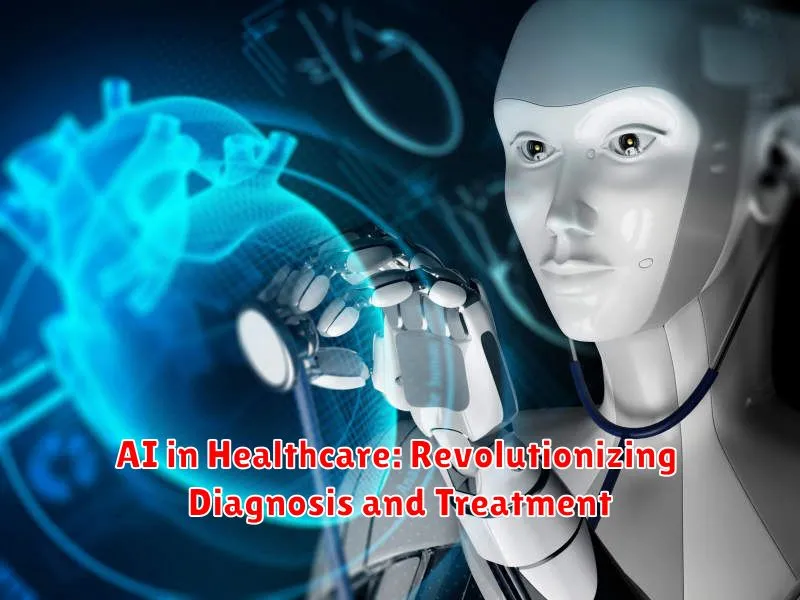
The healthcare industry is undergoing a profound transformation, fueled by the rise of artificial intelligence (AI). AI is revolutionizing diagnosis and treatment, empowering healthcare professionals with powerful tools to enhance accuracy, efficiency, and patient outcomes.
AI-powered diagnostic tools are enabling faster and more accurate disease detection. By analyzing vast amounts of medical data, AI algorithms can identify patterns and anomalies that might be missed by human eyes. This can lead to earlier detection of diseases like cancer, heart disease, and diabetes, improving the chances of successful treatment.
In addition to diagnosis, AI is also transforming treatment methods. AI-driven drug discovery is accelerating the development of new therapies, while personalized medicine leverages AI to tailor treatments to individual patients based on their genetic makeup and other factors. This personalized approach promises more effective and targeted treatments with fewer side effects.
Moreover, AI is revolutionizing healthcare delivery. AI-powered chatbots are providing patients with 24/7 support and answering common medical questions. Virtual assistants are assisting doctors with administrative tasks, freeing up more time for patient care. And remote patient monitoring systems are using AI to track patients’ health data and alert healthcare providers of any potential issues.
The potential of AI in healthcare is vast, and the benefits are only beginning to be realized. As AI technologies continue to evolve, we can expect to see even more innovative applications that will transform the way we diagnose, treat, and manage health conditions.
AI in Finance: Enhancing Decision-Making and Fraud Detection
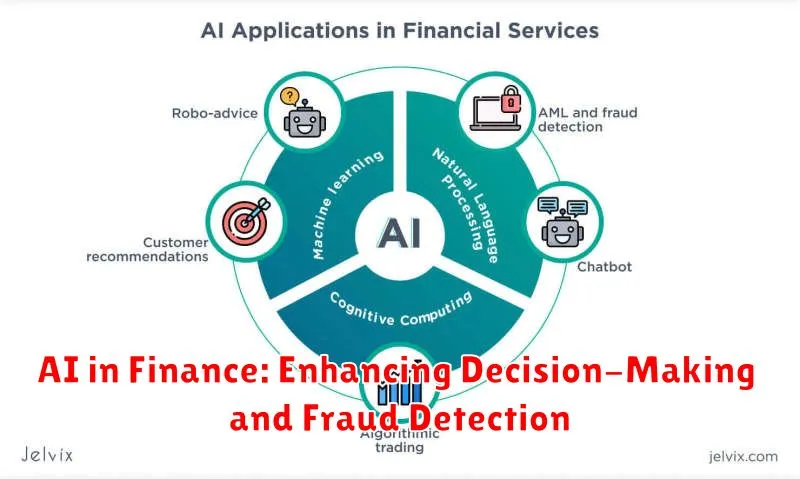
The financial industry is undergoing a digital transformation, driven by the rapid advancement of artificial intelligence (AI). AI is revolutionizing how financial institutions operate, from enhancing decision-making to detecting fraud. AI algorithms are capable of analyzing vast amounts of data, identifying patterns and insights that humans might miss, and automating complex tasks.
AI is playing a significant role in enhancing decision-making in finance. By leveraging machine learning algorithms, financial institutions can analyze market trends, predict customer behavior, and make informed investment decisions. AI-powered robo-advisors provide personalized financial advice, tailoring investment strategies to individual risk profiles and financial goals. Moreover, AI can optimize loan approvals, assess creditworthiness, and automate risk management processes.
Fraud detection is another area where AI is making a substantial impact. AI algorithms can analyze transaction data, identify unusual patterns, and flag suspicious activities. This proactive approach helps financial institutions prevent fraudulent transactions, protect customer assets, and mitigate financial losses. AI-powered fraud detection systems can analyze data from multiple sources, including customer behavior, transaction history, and geolocation data, to provide a comprehensive view of potential fraud risks.
The use of AI in finance is still in its early stages, but its potential is vast. As AI technologies continue to evolve, we can expect even more innovative applications in the financial industry. From personalized financial planning to advanced risk management, AI is poised to transform the way we interact with money and make financial decisions.
AI in Retail and E-commerce: Personalized Experiences and Predictive Analytics
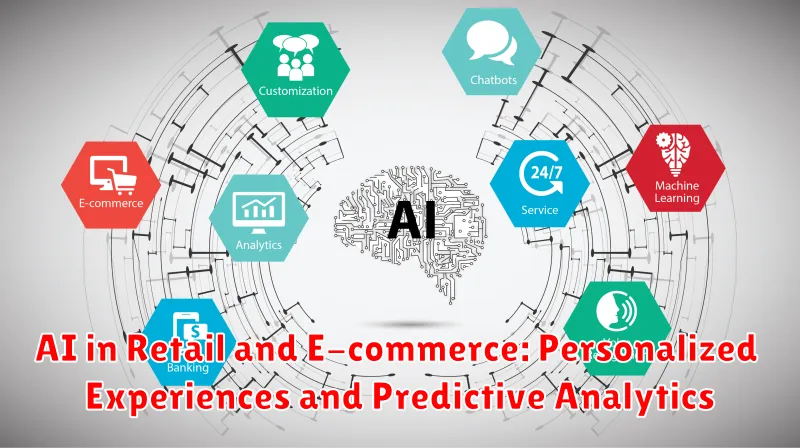
The retail and e-commerce industries are undergoing a dramatic transformation, fueled by the rapid advancements in artificial intelligence (AI). AI is empowering businesses to create more personalized experiences for customers, optimize operations, and gain valuable insights into consumer behavior. This article delves into the specific applications of AI in retail and e-commerce, focusing on how it is driving innovation through personalized experiences and predictive analytics.
Personalized Experiences: AI enables businesses to tailor their offerings to individual customers, creating a more engaging and relevant shopping experience. Recommendation engines powered by AI analyze customer data, purchase history, and browsing behavior to suggest products and services that align with their preferences. Chatbots provide instant support and personalized assistance, answering questions and resolving issues efficiently. This personalized approach fosters customer loyalty and increases conversion rates.
Predictive Analytics: AI algorithms analyze vast amounts of data to predict future trends and customer behavior. This enables retailers to anticipate demand, optimize inventory levels, and personalize marketing campaigns. Demand forecasting helps businesses avoid stockouts and overstocking, minimizing losses and maximizing efficiency. Price optimization algorithms adjust prices dynamically based on real-time demand and competition, ensuring optimal profitability. By leveraging predictive analytics, retailers can make data-driven decisions that enhance their overall performance.
Transformative Impact: The integration of AI in retail and e-commerce is revolutionizing the industry. Personalized experiences and predictive analytics are creating a more efficient, customer-centric, and profitable environment. Retailers are empowered to better understand their customers, personalize their offerings, and make data-driven decisions that drive business growth. As AI continues to evolve, its impact on retail and e-commerce is only expected to become more profound, shaping the future of shopping and customer engagement.
AI in Manufacturing and Supply Chain: Optimizing Processes and Efficiency
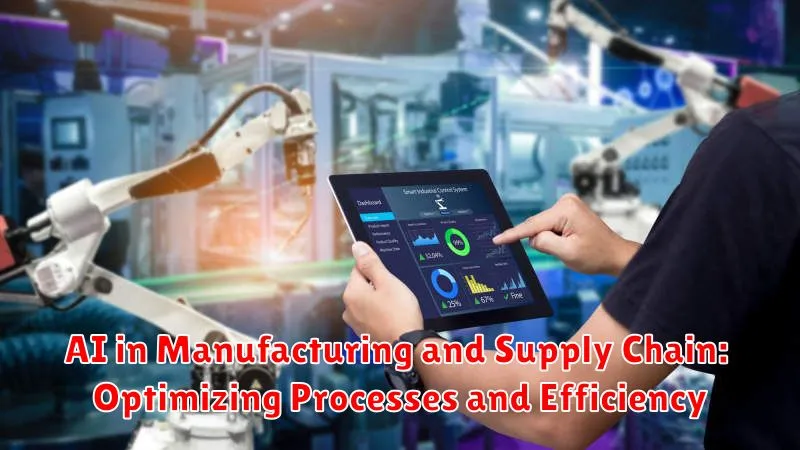
The manufacturing and supply chain industries are undergoing a significant transformation, driven by the adoption of artificial intelligence (AI). AI technologies are revolutionizing how businesses operate, from optimizing production processes to enhancing supply chain logistics. This article explores the key ways AI is transforming manufacturing and supply chains, highlighting its potential to unlock unprecedented levels of efficiency and productivity.
One of the most significant applications of AI in manufacturing is predictive maintenance. By analyzing sensor data from machines and equipment, AI algorithms can predict potential failures before they occur. This proactive approach allows manufacturers to schedule maintenance interventions at optimal times, minimizing downtime and reducing maintenance costs. AI-powered predictive maintenance systems can also identify patterns in machine behavior that might indicate underlying issues, enabling manufacturers to address them before they escalate into major problems.
AI is also playing a crucial role in optimizing supply chain operations. By analyzing vast amounts of data related to demand forecasting, inventory management, and transportation logistics, AI algorithms can identify inefficiencies and suggest improvements. This can lead to more accurate demand forecasting, reduced inventory levels, and optimized delivery routes, resulting in significant cost savings and improved customer satisfaction. AI-powered systems can also automate repetitive tasks, such as order fulfillment and shipment tracking, freeing up human resources to focus on more strategic tasks.
Another area where AI is making a significant impact is quality control. AI-powered vision systems can inspect products for defects at a much faster rate than human inspectors, ensuring consistent quality and reducing the risk of faulty products reaching customers. AI algorithms can also analyze data from manufacturing processes to identify potential quality issues and recommend adjustments, leading to improved product quality and reduced waste.
In addition to these specific applications, AI is also enabling end-to-end process optimization in manufacturing and supply chains. By integrating data from various sources and using AI algorithms to analyze and interpret it, businesses can gain a holistic view of their operations and identify opportunities for improvement. This data-driven approach allows for more informed decision-making and helps organizations adapt to changing market conditions and customer demands.
The benefits of AI in manufacturing and supply chain are numerous. By automating tasks, improving efficiency, and optimizing processes, AI is helping businesses to reduce costs, increase productivity, and enhance competitiveness. As AI technologies continue to evolve, we can expect even more innovative applications in these industries, further transforming how products are manufactured and delivered to consumers.
AI in Transportation and Logistics: Enhancing Safety and Efficiency
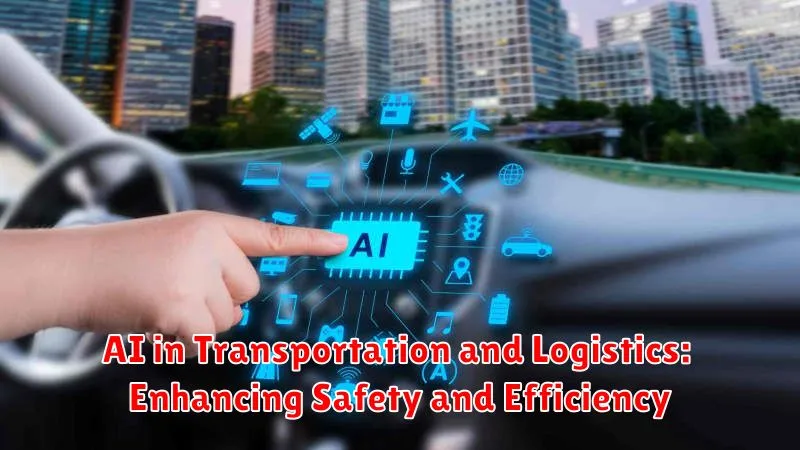
The transportation and logistics industry is undergoing a transformative revolution, driven by the rapid adoption of Artificial Intelligence (AI). AI is playing a pivotal role in enhancing safety, improving efficiency, and optimizing operations across the entire supply chain. From autonomous vehicles to predictive maintenance, AI is unlocking new possibilities and reshaping the future of transportation and logistics.
One of the most impactful applications of AI is in autonomous vehicles. Self-driving trucks and cars have the potential to significantly reduce accidents caused by human error, a leading factor in road fatalities. AI-powered systems can process information from sensors and cameras in real-time, making faster and more accurate decisions than human drivers, ultimately leading to safer roads.
Beyond safety, AI is revolutionizing efficiency in logistics. Predictive analytics powered by AI algorithms can analyze vast amounts of data to anticipate demand, optimize routes, and minimize delays. This enables companies to streamline operations, reduce fuel consumption, and deliver goods faster and more efficiently.
Furthermore, AI is enabling predictive maintenance in the transportation and logistics sector. By analyzing data from sensors on vehicles and equipment, AI models can identify potential issues before they become major problems. This proactive approach minimizes downtime, reduces maintenance costs, and ensures the smooth flow of operations.
The integration of AI is not only transforming individual aspects of transportation and logistics but also enabling smart logistics ecosystems. Connected systems and intelligent platforms are allowing for seamless collaboration between different stakeholders, such as shippers, carriers, and customers, optimizing the entire supply chain. This interconnectedness fosters greater transparency, real-time visibility, and enhanced decision-making.
In conclusion, AI is a game-changer in the transportation and logistics industry. It is driving innovation, enhancing safety, improving efficiency, and ultimately transforming the way goods are moved around the world. As AI technology continues to evolve, we can expect even more groundbreaking applications that will further revolutionize this crucial sector.
AI in Customer Service: Chatbots and Virtual Assistants
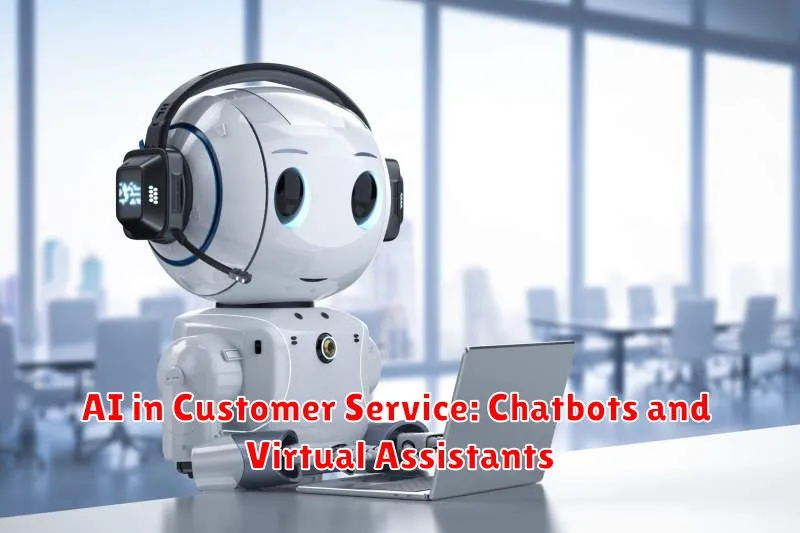
The world of customer service is rapidly changing, and artificial intelligence (AI) is at the forefront of this transformation. Chatbots and virtual assistants, powered by AI, are revolutionizing how businesses interact with their customers, offering a more efficient and personalized experience.
Chatbots, essentially computer programs designed to simulate conversation, are becoming increasingly sophisticated. They can handle a wide range of customer inquiries, from simple questions about products or services to more complex issues like troubleshooting and order tracking. Virtual assistants, on the other hand, offer a more comprehensive solution, providing a personalized and proactive experience. They can learn about customer preferences, anticipate needs, and even make recommendations based on previous interactions.
The benefits of using AI-powered customer service tools are numerous. They offer 24/7 availability, meaning customers can get help whenever they need it. They also provide instant responses, reducing wait times and improving customer satisfaction. Furthermore, AI tools can handle a high volume of inquiries, freeing up human agents to focus on more complex issues.
Beyond efficiency, AI also enhances the personalization of customer interactions. By analyzing data and understanding customer behavior, these tools can tailor responses and recommendations to individual needs. This personalized approach fosters stronger customer relationships and increases loyalty.
As AI continues to advance, we can expect even more innovative applications in customer service. Natural language processing (NLP) is enabling chatbots to understand and respond to more complex and nuanced inquiries. Machine learning (ML) is empowering virtual assistants to learn from customer interactions and continuously improve their performance. The future of customer service is clearly AI-driven, promising a more efficient, personalized, and engaging experience for both businesses and customers alike.
AI in Education: Personalized Learning and Adaptive Assessments
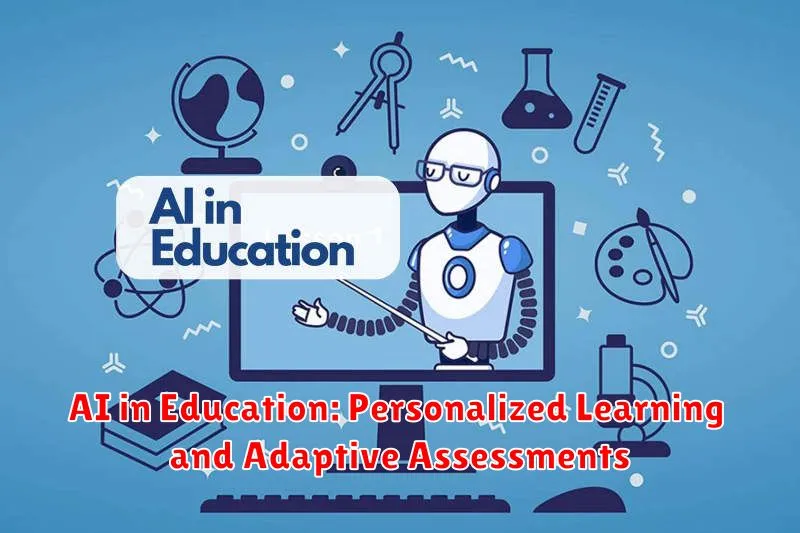
Artificial intelligence (AI) is rapidly transforming various industries, and education is no exception. The integration of AI in education holds immense potential to revolutionize learning experiences and unlock new avenues for student success. One of the most promising applications of AI in education is its ability to personalize learning and deliver adaptive assessments.
Personalized learning, powered by AI, tailors educational content and approaches to meet the unique needs of each student. By analyzing student data, such as learning styles, strengths, and weaknesses, AI algorithms can generate customized learning paths, provide targeted recommendations, and offer personalized feedback. This individualized approach allows students to learn at their own pace, focusing on areas where they require more support and accelerating through topics they already understand.
Adaptive assessments utilize AI to create dynamic evaluations that adapt to student performance in real-time. These assessments can adjust difficulty levels, provide hints and feedback, and identify areas where students require further instruction. By constantly monitoring student progress, adaptive assessments offer a more accurate and comprehensive measure of learning outcomes than traditional assessments.
The implementation of AI-powered personalized learning and adaptive assessments can bring numerous benefits to students, educators, and the education system as a whole. Students can experience increased engagement, motivation, and academic achievement, while educators gain valuable insights into student learning and can tailor their teaching strategies accordingly. Ultimately, AI has the potential to create a more equitable and effective educational system that empowers all learners to reach their full potential.
AI in Marketing and Advertising: Targeted Campaigns and Customer Insights
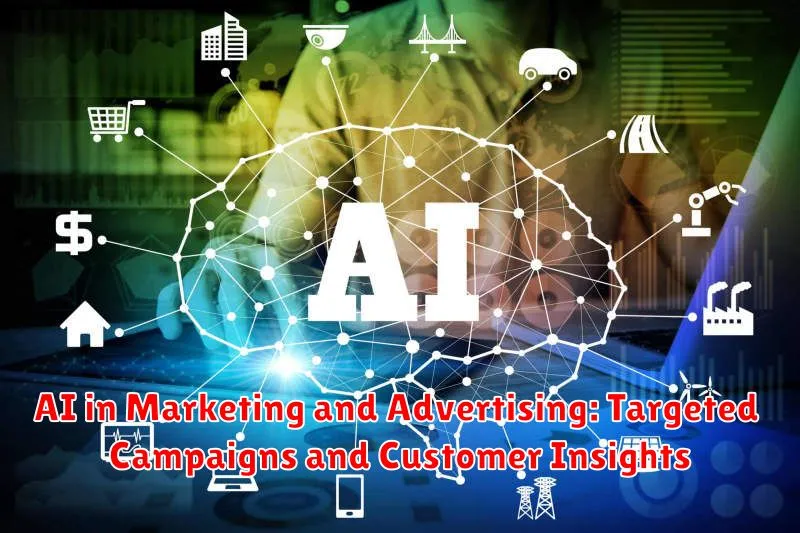
Artificial intelligence (AI) is revolutionizing the way businesses interact with their customers, particularly in the realm of marketing and advertising. AI-powered tools and technologies are empowering marketers to create targeted campaigns that resonate with specific audiences and gain valuable customer insights, ultimately leading to increased engagement, conversions, and ROI.
One of the most significant ways AI is transforming marketing is through personalized customer experiences. By analyzing vast amounts of data, AI algorithms can identify patterns and preferences, allowing marketers to tailor their messaging and offers to individual consumers. This level of personalization can significantly enhance customer satisfaction and loyalty.
Moreover, AI is enabling marketers to create highly effective targeted campaigns. By leveraging data on demographics, interests, browsing history, and purchase behavior, AI can identify potential customers with a high likelihood of converting. This allows marketers to allocate their advertising budget strategically, maximizing their return on investment.
Beyond targeted campaigns, AI is providing marketers with unprecedented insights into customer behavior. AI-powered analytics platforms can analyze customer data in real time, revealing patterns and trends that would be impossible to identify manually. This data can be used to optimize campaigns, improve customer service, and develop new products and services.
The future of marketing and advertising is undoubtedly intertwined with AI. As AI technology continues to evolve, we can expect even more sophisticated and innovative applications that will further enhance customer experiences and drive business growth. By embracing AI, marketers can unlock a world of possibilities and stay ahead in an increasingly competitive landscape.
Ethical Considerations and the Future of AI
As artificial intelligence (AI) rapidly advances, its transformative potential across industries is undeniable. From automating tasks to enhancing decision-making, AI promises to revolutionize the way we live and work. However, this groundbreaking technology also raises crucial ethical considerations that we must address to ensure its responsible development and deployment.
One major concern is the potential for AI systems to perpetuate existing biases. AI algorithms are trained on vast datasets, which can reflect societal prejudices and inequalities. If these biases are not addressed, AI could amplify discrimination and marginalization. This emphasizes the need for transparency and accountability in AI development, ensuring that algorithms are fair, unbiased, and aligned with ethical principles.
Furthermore, the rise of AI raises questions about privacy and data security. As AI systems collect and analyze massive amounts of personal data, concerns about data breaches and misuse become paramount. Safeguarding individual privacy while enabling AI innovation requires robust data protection regulations and responsible data management practices.
Moreover, the increasing autonomy of AI systems raises concerns about accountability and control. As AI systems become more sophisticated, who is responsible for their actions? Establishing clear guidelines for AI decision-making and ensuring human oversight are critical to preventing unintended consequences.
Looking ahead, navigating the ethical landscape of AI is essential for unlocking its full potential. By prioritizing ethical considerations, fostering open dialogue, and promoting responsible AI development, we can ensure that AI serves as a force for good, empowering humanity and contributing to a more equitable and sustainable future.
Addressing Bias and Ensuring Responsible AI Development
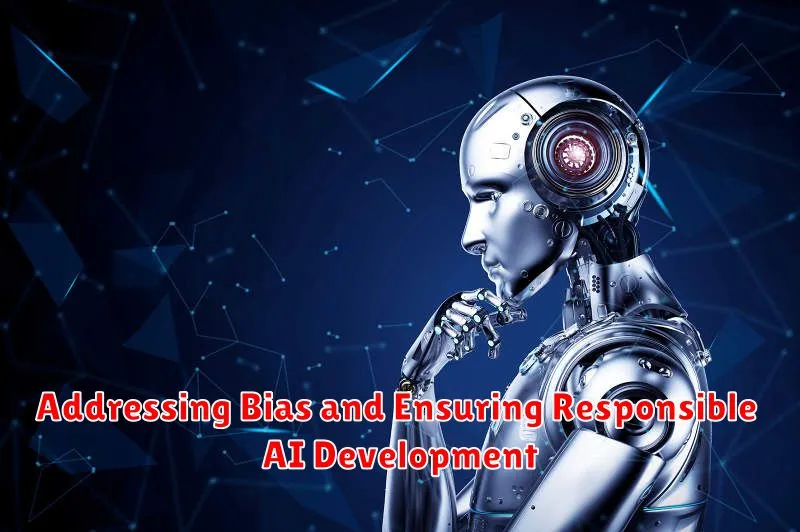
As Artificial Intelligence (AI) continues its rapid evolution, its potential to transform industries is undeniable. However, with this transformative power comes a critical responsibility: addressing bias and ensuring ethical development. AI systems, trained on vast amounts of data, can inadvertently inherit and amplify societal biases present in the data itself. This can lead to discriminatory outcomes, undermining fairness and trust in AI applications.
To mitigate this risk, a multi-pronged approach is essential. Data diversity is paramount. Training data should reflect the real-world diversity of the population, minimizing the risk of skewed representations. Algorithmic transparency, allowing for scrutiny and understanding of how AI systems arrive at decisions, is crucial for identifying and rectifying biases. Continuous monitoring and evaluation are vital to ensure ongoing fairness and prevent the perpetuation of biased outcomes.
Furthermore, fostering inclusive collaboration across disciplines is key. Data scientists, ethicists, and domain experts must work together to develop and deploy AI systems responsibly. This collaboration ensures that diverse perspectives and ethical considerations are integrated from the outset.
Addressing bias and ensuring responsible AI development is not merely a technical challenge; it’s a fundamental ethical imperative. By prioritizing fairness, transparency, and inclusivity, we can harness the transformative power of AI while safeguarding against its potential pitfalls.
The Impact of AI on the Workforce and Job Market
The rapid advancement of Artificial Intelligence (AI) is transforming industries at an unprecedented pace, bringing about both exciting opportunities and significant challenges. One of the most discussed and debated aspects of this transformation is the impact of AI on the workforce and job market.
AI is already automating tasks across various sectors, from manufacturing and logistics to finance and customer service. This automation can lead to increased efficiency, productivity, and cost savings for businesses. However, it also raises concerns about job displacement, as machines become capable of performing tasks previously done by humans.
While some jobs may be eliminated, AI is also creating new opportunities in fields related to AI development, data science, and AI-related services. The future workforce will need to adapt to this changing landscape, developing skills in areas such as data analysis, problem-solving, and critical thinking. Upskilling and reskilling initiatives will be crucial to bridge the gap between the existing workforce and the demands of the AI-driven economy.
Furthermore, AI can enhance existing jobs by providing employees with tools to perform their tasks more efficiently and effectively. For example, AI-powered assistants can provide real-time insights and support, allowing employees to focus on more complex and creative tasks. This collaboration between humans and AI has the potential to unlock new levels of productivity and innovation.
The impact of AI on the workforce is complex and multifaceted. While there are concerns about job displacement, AI is also creating new opportunities and enhancing existing jobs. By embracing upskilling and reskilling initiatives, fostering collaboration between humans and AI, and focusing on developing skills that complement AI capabilities, we can navigate this transition and harness the potential of AI to create a more prosperous and equitable future for all.
The Transformative Potential of AI Across Industries
Artificial intelligence (AI) is rapidly transforming industries across the globe, ushering in a new era of automation, efficiency, and innovation. From healthcare to finance, manufacturing to retail, AI’s transformative potential is undeniable. Its ability to analyze vast amounts of data, identify patterns, and make predictions empowers businesses to make better decisions, optimize processes, and deliver personalized experiences.
In healthcare, AI is revolutionizing diagnosis, treatment, and drug discovery. Machine learning algorithms can analyze medical images to detect diseases earlier, predict patient outcomes, and personalize treatment plans. AI-powered chatbots are also being used to provide patients with 24/7 support and answer their questions.
In finance, AI is automating tasks, detecting fraud, and enhancing customer service. AI algorithms can analyze financial data to identify investment opportunities, assess credit risk, and personalize financial advice. AI-powered chatbots can answer customer queries, process transactions, and provide financial guidance.
In manufacturing, AI is optimizing production processes, improving quality control, and driving innovation. AI algorithms can analyze sensor data to predict equipment failures, optimize production schedules, and automate quality inspections. AI is also being used to design new products and materials, accelerating innovation.
In retail, AI is personalizing customer experiences, optimizing pricing, and driving sales. AI algorithms can analyze customer data to understand their preferences, recommend products, and personalize marketing campaigns. AI-powered chatbots can provide real-time customer support and answer questions.
The transformative potential of AI is immense. As AI technologies continue to evolve, we can expect to see even more innovative applications across industries. From improving healthcare outcomes to driving economic growth, AI has the potential to create a better future for all.

